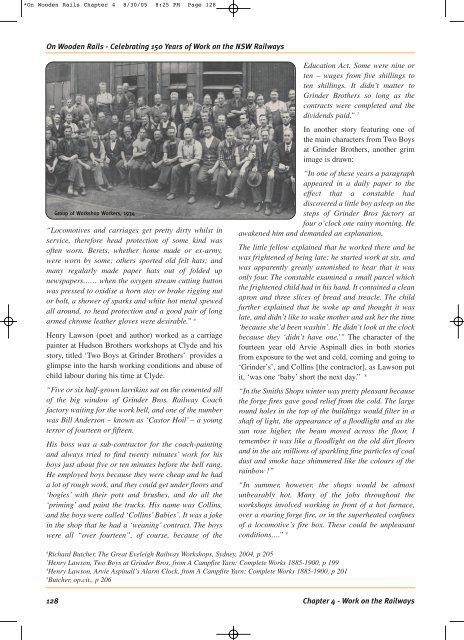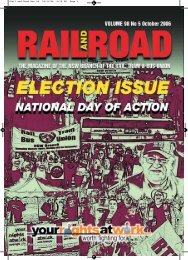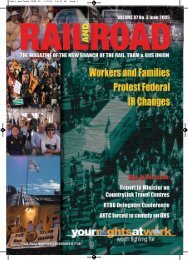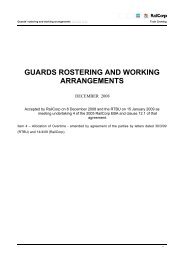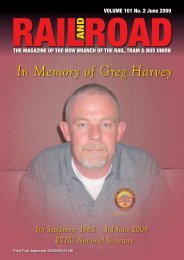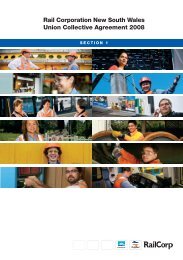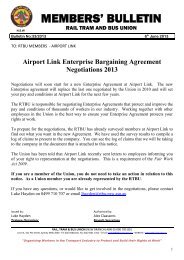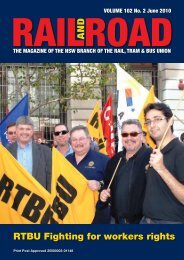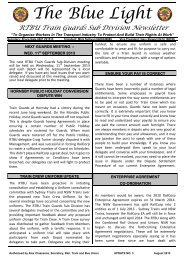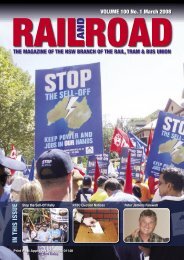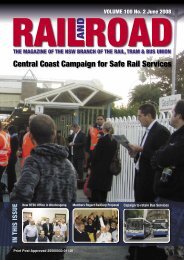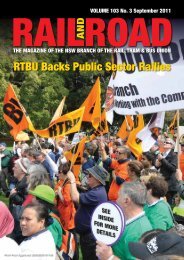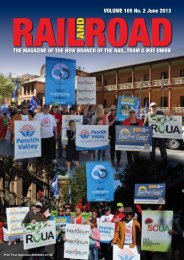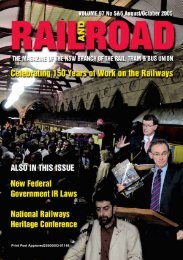Chapter 4 - Work on the Railways - Rail, Tram and Bus Union of NSW
Chapter 4 - Work on the Railways - Rail, Tram and Bus Union of NSW
Chapter 4 - Work on the Railways - Rail, Tram and Bus Union of NSW
You also want an ePaper? Increase the reach of your titles
YUMPU automatically turns print PDFs into web optimized ePapers that Google loves.
*On Wooden <strong>Rail</strong>s <str<strong>on</strong>g>Chapter</str<strong>on</strong>g> 4 8/30/05 8:25 PM Page 128<br />
On Wooden <strong>Rail</strong>s - Celebrating 150 Years <strong>of</strong> <str<strong>on</strong>g>Work</str<strong>on</strong>g> <strong>on</strong> <strong>the</strong> <strong>NSW</strong> <strong><strong>Rail</strong>ways</strong><br />
“Locomotives <strong>and</strong> carriages get pretty dirty whilst in<br />
service, <strong>the</strong>refore head protecti<strong>on</strong> <strong>of</strong> some kind was<br />
<strong>of</strong>ten worn. Berets, whe<strong>the</strong>r home made or ex-army,<br />
were worn by some; o<strong>the</strong>rs sported old felt hats; <strong>and</strong><br />
many regularly made paper hats out <strong>of</strong> folded up<br />
newspapers…… when <strong>the</strong> oxygen stream cutting butt<strong>on</strong><br />
was pressed to oxidise a horn stay or brake rigging nut<br />
or bolt, a shower <strong>of</strong> sparks <strong>and</strong> white hot metal spewed<br />
all around, so head protecti<strong>on</strong> <strong>and</strong> a good pair <strong>of</strong> l<strong>on</strong>g<br />
armed chrome lea<strong>the</strong>r gloves were desirable.” 6<br />
Henry Laws<strong>on</strong> (poet <strong>and</strong> author) worked as a carriage<br />
painter at Huds<strong>on</strong> Bro<strong>the</strong>rs workshops at Clyde <strong>and</strong> his<br />
story, titled ‘Two Boys at Grinder Bro<strong>the</strong>rs’ provides a<br />
glimpse into <strong>the</strong> harsh working c<strong>on</strong>diti<strong>on</strong>s <strong>and</strong> abuse <strong>of</strong><br />
child labour during his time at Clyde.<br />
“Five or six half-grown larrikins sat <strong>on</strong> <strong>the</strong> cemented sill<br />
<strong>of</strong> <strong>the</strong> big window <strong>of</strong> Grinder Bros. <strong>Rail</strong>way Coach<br />
factory waiting for <strong>the</strong> work bell, <strong>and</strong> <strong>on</strong>e <strong>of</strong> <strong>the</strong> number<br />
was Bill Anders<strong>on</strong> – known as ‘Castor Hoil’ – a young<br />
terror <strong>of</strong> fourteen or fifteen.<br />
His boss was a sub-c<strong>on</strong>tractor for <strong>the</strong> coach-painting<br />
<strong>and</strong> always tried to find twenty minutes’ work for his<br />
boys just about five or ten minutes before <strong>the</strong> bell rang.<br />
He employed boys because <strong>the</strong>y were cheap <strong>and</strong> he had<br />
a lot <strong>of</strong> rough work, <strong>and</strong> <strong>the</strong>y could get under floors <strong>and</strong><br />
‘bogies’ with <strong>the</strong>ir pots <strong>and</strong> brushes, <strong>and</strong> do all <strong>the</strong><br />
‘priming’ <strong>and</strong> paint <strong>the</strong> trucks. His name was Collins,<br />
<strong>and</strong> <strong>the</strong> boys were called ‘Collins’ Babies’. It was a joke<br />
in <strong>the</strong> shop that he had a ‘weaning’ c<strong>on</strong>tract. The boys<br />
were all “over fourteen”, <strong>of</strong> course, because <strong>of</strong> <strong>the</strong><br />
128<br />
Group <strong>of</strong> <str<strong>on</strong>g>Work</str<strong>on</strong>g>shop <str<strong>on</strong>g>Work</str<strong>on</strong>g>ers, 1934<br />
Educati<strong>on</strong> Act. Some were nine or<br />
ten – wages from five shillings to<br />
ten shillings. It didn’t matter to<br />
Grinder Bro<strong>the</strong>rs so l<strong>on</strong>g as <strong>the</strong><br />
c<strong>on</strong>tracts were completed <strong>and</strong> <strong>the</strong><br />
dividends paid.” 7<br />
In ano<strong>the</strong>r story featuring <strong>on</strong>e <strong>of</strong><br />
<strong>the</strong> main characters from Two Boys<br />
at Grinder Bro<strong>the</strong>rs, ano<strong>the</strong>r grim<br />
image is drawn:<br />
“In <strong>on</strong>e <strong>of</strong> <strong>the</strong>se years a paragraph<br />
appeared in a daily paper to <strong>the</strong><br />
effect that a c<strong>on</strong>stable had<br />
discovered a little boy asleep <strong>on</strong> <strong>the</strong><br />
steps <strong>of</strong> Grinder Bros factory at<br />
four o’clock <strong>on</strong>e rainy morning. He<br />
awakened him <strong>and</strong> dem<strong>and</strong>ed an explanati<strong>on</strong>.<br />
The little fellow explained that he worked <strong>the</strong>re <strong>and</strong> he<br />
was frightened <strong>of</strong> being late; he started work at six, <strong>and</strong><br />
was apparently greatly ast<strong>on</strong>ished to hear that it was<br />
<strong>on</strong>ly four. The c<strong>on</strong>stable examined a small parcel which<br />
<strong>the</strong> frightened child had in his h<strong>and</strong>. It c<strong>on</strong>tained a clean<br />
apr<strong>on</strong> <strong>and</strong> three slices <strong>of</strong> bread <strong>and</strong> treacle. The child<br />
fur<strong>the</strong>r explained that he woke up <strong>and</strong> thought it was<br />
late, <strong>and</strong> didn’t like to wake mo<strong>the</strong>r <strong>and</strong> ask her <strong>the</strong> time<br />
‘because she’d been washin’. He didn’t look at <strong>the</strong> clock<br />
because <strong>the</strong>y ‘didn’t have <strong>on</strong>e.’” The character <strong>of</strong> <strong>the</strong><br />
fourteen year old Arvie Aspinall dies in both stories<br />
from exposure to <strong>the</strong> wet <strong>and</strong> cold, coming <strong>and</strong> going to<br />
‘Grinder’s’, <strong>and</strong> Collins [<strong>the</strong> c<strong>on</strong>tractor], as Laws<strong>on</strong> put<br />
it, ‘was <strong>on</strong>e ‘baby’ short <strong>the</strong> next day.” 8<br />
“In <strong>the</strong> Smiths Shops winter was pretty pleasant because<br />
<strong>the</strong> forge fires gave good relief from <strong>the</strong> cold. The large<br />
round holes in <strong>the</strong> top <strong>of</strong> <strong>the</strong> buildings would filter in a<br />
shaft <strong>of</strong> light, <strong>the</strong> appearance <strong>of</strong> a floodlight <strong>and</strong> as <strong>the</strong><br />
sun rose higher, <strong>the</strong> beam moved across <strong>the</strong> floor. I<br />
remember it was like a floodlight <strong>on</strong> <strong>the</strong> old dirt floors<br />
<strong>and</strong> in <strong>the</strong> air, milli<strong>on</strong>s <strong>of</strong> sparkling fine particles <strong>of</strong> coal<br />
dust <strong>and</strong> smoke haze shimmered like <strong>the</strong> colours <strong>of</strong> <strong>the</strong><br />
rainbow !”<br />
“In summer, however, <strong>the</strong> shops would be almost<br />
unbearably hot. Many <strong>of</strong> <strong>the</strong> jobs throughout <strong>the</strong><br />
workshops involved working in fr<strong>on</strong>t <strong>of</strong> a hot furnace,<br />
over a roaring forge fire, or in <strong>the</strong> superheated c<strong>on</strong>fines<br />
<strong>of</strong> a locomotive’s fire box. These could be unpleasant<br />
c<strong>on</strong>diti<strong>on</strong>s….” 9<br />
6 Richard Butcher, The Great Eveleigh <strong>Rail</strong>way <str<strong>on</strong>g>Work</str<strong>on</strong>g>shops, Sydney, 2004, p 205<br />
7 Henry Laws<strong>on</strong>, Two Boys at Grinder Bros, from A Campfire Yarn: Complete <str<strong>on</strong>g>Work</str<strong>on</strong>g>s 1885-1900, p 199<br />
8 Henry Laws<strong>on</strong>, Arvie Aspinall’s Alarm Clock, from A Campfire Yarn: Complete <str<strong>on</strong>g>Work</str<strong>on</strong>g>s 1885-1900, p 201<br />
9 Butcher, op.cit., p 206<br />
<str<strong>on</strong>g>Chapter</str<strong>on</strong>g> 4 - <str<strong>on</strong>g>Work</str<strong>on</strong>g> <strong>on</strong> <strong>the</strong> <strong><strong>Rail</strong>ways</strong>


